Listen to the Podcast
3 June 2022 - Podcast #795 - (21:35)
It's Like NPR on the Web
If you find the information TechByter Worldwide provides useful or interesting, please consider a contribution.

If you find the information TechByter Worldwide provides useful or interesting, please consider a contribution.
Last August, I described our cord-cutting procedure that began in June. My wife and I were a bit late to the party, but a huge increase in the cable TV fee had pushed our monthly bill to $216. We've been without cable television for a year now. Maybe you're wondering how it's going.
Click any small image for a full-size view. To dismiss the larger image, press ESC or tap outside the image.
 We selected the internet service provider's 500Mbps plan at $50 per month and that has worked exceedingly well. The speeds are usually at or slightly above what Wide Open West promised. WOW has been acquired by Breezeline and the good service has continued.
We selected the internet service provider's 500Mbps plan at $50 per month and that has worked exceedingly well. The speeds are usually at or slightly above what Wide Open West promised. WOW has been acquired by Breezeline and the good service has continued.
 In television's early days, it was necessary to remember when a program was on. With just two or three channels available, it was easy to find the program even if you didn't remember the channel. Then cable television came along and perhaps you had to remember the time and which of 100 or more channels a program was on. Today we have 30 or more over-the-air channels available where I live. It's rare for me to watch any of them, but I didn't watch much television until last year. I mainly used the television to binge-watch old series programs and motion pictures.
In television's early days, it was necessary to remember when a program was on. With just two or three channels available, it was easy to find the program even if you didn't remember the channel. Then cable television came along and perhaps you had to remember the time and which of 100 or more channels a program was on. Today we have 30 or more over-the-air channels available where I live. It's rare for me to watch any of them, but I didn't watch much television until last year. I mainly used the television to binge-watch old series programs and motion pictures.
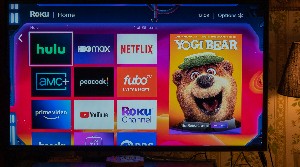 But I've possibly watched more streaming programs in about ten months than I had watched in the previous five years, or ten. Because streaming is on-demand, I don't have to remember when a program is on, only which service has it and which episodes I've already seen. I keep a list of programs I'm watching or want to watch, including DVDs from the library. Including information about which episodes I've seen is helpful because not all streaming services do a good job with that information.
But I've possibly watched more streaming programs in about ten months than I had watched in the previous five years, or ten. Because streaming is on-demand, I don't have to remember when a program is on, only which service has it and which episodes I've already seen. I keep a list of programs I'm watching or want to watch, including DVDs from the library. Including information about which episodes I've seen is helpful because not all streaming services do a good job with that information.
Phyllis's viewing hasn't changed a lot. Fubo has everything that she used to watch on cable television, such as the Food Network, Bravo, and HGTV. Fubo even includes local channels now so there's less need to switch between over-the-air stations using the television's antenna and the TV remote control, and streaming on internet television with the Roku remote control. During the week, she watches primarily over-the-air programs; on the weekends, it's usually programs on the Food Network and PBS. Unlike me, Phyllis does not binge-watch anything and hasn't investigated programs that are available on the other services. She's also not particularly interested in old motion pictures or old series television programs. She says "Most ancient TV series weren't that good ever."
How satisfactory is this arrangement and are we really saving any money? Let's see:
After the higher fee goes into effect for AMC+, that's $162/month versus $216/ month, a savings of just over $650/year.
All of this is not without some annoyances. Some of the "free" streaming services have extraordinary commercial loads: IMDB and Tubi, for example, sometimes show five minutes of video and three minutes of commercials. Besides creating a mess with motion picture continuity, the commercials turn a 90 minute film into a nearly three-hour slog. As a result, the free streaming services are my last resort.
Sometimes programs that were once included with one service are dropped or fees are added. One of the BBC's longest-running shows, Doctor Who, is an example. Doctor Who premiered in 1963 and ran continuously until 1989 with seven actors playing the Doctor during the 26-year run. All of the episodes that have survived are available on BritBox. Unfortunately, the BBC recycled some of the early tapes, so episodes were lost, and there have been six more doctors.
The eighth doctor appeared only in a television motion picture in 1986, and it appears not to be available for streaming. Many of the episodes of Doctor Who starting in 2005 (9th doctor through 13th doctor) are available on Amazon Prime Video, but they are no longer included with the subscription and this means you'll pay extra for each episode. Fortunately, HBO Max has all of the episodes with doctors nine through twelve and the first two seasons with with Jodie Whittaker as the 13th Doctor.
Because of covid, Doctor Who had just six programs in 2021 from October through December. Three specials are scheduled for 2022. Eve of the Daleks and Legend of the Sea Devils have already been broadcast and are available for an extra fee on Prime. Legend of the Sea Devils is also included in an AMC+ subscription. A still unnamed centenary special will feature Whitaker's regeneration as Ncuti Gatwa (that's pronounced SHOO-ti GAT-wa) takes over the role. It's anybody's guess where we'll find that episode.
The choice of options for British television can be a bit confusing. Doctor Who is a BBC program, so it would seem logical that all of the programs would be carried on BBC America. I've heard some people say that BBC America is a fine service so long as you're not interested in British television programs. That's not entirely inaccurate. BBC America is included in packages from Sling TV, PlayStation Vue, and DirecTV Now. Some programs are included with Prime Video, but many of them have fees. Both BritBox and Acorn cost about $6/month, or a one-time annual payment of $70. BritBox is a joint venture with the BBC and ITV, so it has a wide range of British programs. Acorn includes programs from Australia, Canada, Ireland, and New Zealand in addition to a good lineup from Britain.
Tennant's wife, Georgia, is one of the primary characters in Staged and they have an interesting history. In 2008, Georgia Moffett (who is the daughter of the fifth doctor in Doctor Who, Peter Moffett whose stage name is Peter Davison) was the doctor's daughter in an episode with David Tennant as the tenth Doctor, called The Doctor's Daughter. Are you with me so far? Fast-forward a few years to 2011 when Georgia married Tennant. So the doctor's daughter, who played the doctor's daughter, married the doctor. They have three daughters and two sons. That has nothing at all to do with cord cutting, but it amuses me.

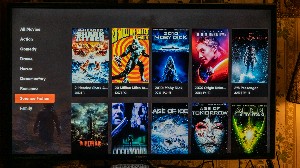 But there are also some unexpected delights. David Tennant and Michael Sheen who were perfectly paired as an angel and a demon in Good Omens return as the primary characters in Staged. They play fictionalized versions of themselves trying to rehearse a stage play when covid has shut everything down. There seems to be a lot of ad-libbing in the two-season program and an enormous amount of profanity. You have been warned. Staged ran on Hulu, but is no longer there. Instead, it's now on Pluto TV with commercials. It's better without commercials, but Pluto's load is acceptable.
But there are also some unexpected delights. David Tennant and Michael Sheen who were perfectly paired as an angel and a demon in Good Omens return as the primary characters in Staged. They play fictionalized versions of themselves trying to rehearse a stage play when covid has shut everything down. There seems to be a lot of ad-libbing in the two-season program and an enormous amount of profanity. You have been warned. Staged ran on Hulu, but is no longer there. Instead, it's now on Pluto TV with commercials. It's better without commercials, but Pluto's load is acceptable.
British television has some substantial differences from US television. Television programs here strictly avoid what George Carlin described as The Seven Words You Can Never Say on Television, and a lot more. British television programs don't have to worry about that, at least after nine at night. Likewise, nudity is OK after nine. Martin Clunes (who plays the doctor in Doc Martin) says that any medical procedures used in the program must be accurately portrayed, which is more restrictive than in the US. As a result, they have a medical consultant. British television seems not to be particularly squeamish when showing surgical procedures, either. Seasons are much shorter on British television, sometimes with just six or eight episodes, and I've noticed a propensity to create two-part programs in series shows. Sorry, I'm rambling uncontrollably. Again.
Phyllis says "It has been a satisfactory transition. I can still see the programs I liked before. And all that other stuff is there if I get desperate." Adding Fubo to the third television in the house, one that previously had no cable box, provides cable-like access and she likes that.
The change has been more than satisfactory for me. I've enjoyed some of the original programming from Amazon, Netflix, and Hulu. I have watched some of the antique television programs, but mainly just a few programs from any series. Notable exceptions are the Twilight Zone, M*A*S*H, and some Star Trek episodes, both the original series and the Next Generation programs.
So, less money (even with a bunch of extra services added on) and more choices. I'll classify it as a winner.
Web browser Firefox has been around since 2004 and it was almost immediately a hit. By 2011, Firefox had about one third of the browser market and appeared to be on the path to beat Internet Explorer. Since then, it's been all down hill.
Click any small image for a full-size view. To dismiss the larger image, press ESC or tap outside the image.
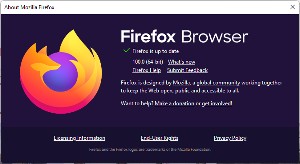 Google released Chrome in late 2008 and became the unquestioned leader with nearly two thirds of the market now compared to Firefox's eight percent, Safari's ten percent (but only on MacOS computers), and Microsoft Edge's ten percent. Those figures represent browser usage on desktop computers. On mobile devices, Safari is the winner with more than half of the market versus Chrome's 40 percent. Firefox, Opera, and Edge combined have less than two percent of the mobile market.
Google released Chrome in late 2008 and became the unquestioned leader with nearly two thirds of the market now compared to Firefox's eight percent, Safari's ten percent (but only on MacOS computers), and Microsoft Edge's ten percent. Those figures represent browser usage on desktop computers. On mobile devices, Safari is the winner with more than half of the market versus Chrome's 40 percent. Firefox, Opera, and Edge combined have less than two percent of the mobile market.
Despite the decline, Firefox still has more than 200 million monthly users. I'm one of those, even though Vivaldi, which is based on Chrome, is my primary browser. Firefox has some of the best security and privacy features available, but Android phones come with Chrome already installed, Windows computers come with Edge already installed, and Google does everything possible to convince us to switch to Chrome.
But Firefox is the only alternative to Chrome-based browsers. Do we really want Chrome to be the only browser available? Developers such as Vivaldi, Microsoft Edge, Brave, and Opera all add features to the underlying Chrome engine, the core product is Google's and Google has a lot of control over what's in there.
If Firefox isn't installed on your computer today, please install it. You don't have to set it as your primary browser, but use it at least occasionally. Monopolies are never good for anybody, so it's important to maintain an alternative. Over the years, I've set a variety of browsers as my default, but I've always returned to Firefox. Vivaldi has been my default for quite some time now and I like the way that it works, but Firefox is the primary browser on my Android phone and on an IPad.
Eighteen years ago, several hundred people worked on the initial Firefox release. It blocked pop-ups, improved on the concept of tabbed browsing, and had several worthwhile security features. Safety and security are still key points for the developers.
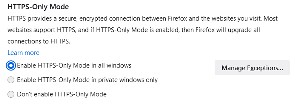 Firefox runs on Windows and MacOS computers, of course, but also on Linux systems, and mobile devices that run Android and IOS. A new HTTPS-only feature attempts to use secure HTTP (HTTPS) even if the user doesn't specify it. Many websites offer HTTPS, but not all implement it well. TechByter Worldwide, for example, will switch to HTTPS on any browser even if you don't specify it. If you use http://techbyter.com/ you'll still be connected to https://techbyter.com/. Copy the HTTP link and try it.
Firefox runs on Windows and MacOS computers, of course, but also on Linux systems, and mobile devices that run Android and IOS. A new HTTPS-only feature attempts to use secure HTTP (HTTPS) even if the user doesn't specify it. Many websites offer HTTPS, but not all implement it well. TechByter Worldwide, for example, will switch to HTTPS on any browser even if you don't specify it. If you use http://techbyter.com/ you'll still be connected to https://techbyter.com/. Copy the HTTP link and try it.
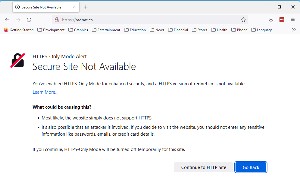 Firefox automatically switches to a secure connection if the site has it, even if secure HTTP hasn't been properly implemented. If HTTPS isn't available, you'll see a warning. If the warning appears, you can make an informed decision about whether you want to proceed.
Firefox automatically switches to a secure connection if the site has it, even if secure HTTP hasn't been properly implemented. If HTTPS isn't available, you'll see a warning. If the warning appears, you can make an informed decision about whether you want to proceed.
No website browser is perfect, and that includes Firefox. Any browser that provides built-in protective features such as Firefox's HTTPS-only is worth looking at.
These days, just about everybody has at least one USB thumb drive, but they were both astonishing and expensive only 20 years ago.
Click any small image for a full-size view. To dismiss the larger image, press ESC or tap outside the image.
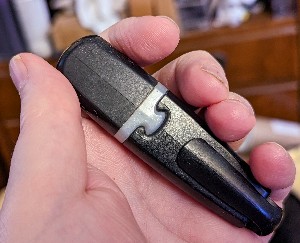 I wrote about "Disk on Key" after returning from the 2001 PC Expo in New York City. The drive stored an astonishing 16MB of data and cost only $70. A smaller 8MB drive was available for $50. The company that made Disk on Key is no longer in business and PC Expo's last gasp was in 2002.
I wrote about "Disk on Key" after returning from the 2001 PC Expo in New York City. The drive stored an astonishing 16MB of data and cost only $70. A smaller 8MB drive was available for $50. The company that made Disk on Key is no longer in business and PC Expo's last gasp was in 2002.
I thought about this when I looked into a drawer where I store USB thumb drives that I've collected over the years. They range from 16 to 64 gigabytes. Even the smallest drive is 1000 times larger than that amazing $70 16MB drive from 2001. That drawer has almost 20 thumb drives that could store more than 1040 gigabytes of data.
By 2008, I was excited by a 16GB drive that I would buy for $25. Today 64GB drives are available for $10, MicroCenter frequently gives away 16GB drives just to attract customers. I boasted about carrying 6GB of storage with me in 2008. Today I carry 0GB of storage with me even though it would be easy to take 1TB of storage.
Why nothing? Times have changed. If I need a file to be available on a mobile device, I can save it to Google Drive or Microsoft's OneDrive.
That's the way tech works. My employer in the 1980s needed to create CDs for client. We bought at CD burner for more than $3000 that required an expensive application to burn discs. The process required more than hour and failed about as many times as it succeeded. Today's DVD burners cost about $50 and free applications exists to burn discs. But who uses discs any more? Applications are either online or, if they're installed on the computer, the installation files are downloaded.
Most computers don't come with optical drives, but Ethernet ports and Wi-Fi are common. Both of those would have been extra-cost options around the turn of the century.
 But to get back to thumb drives for a moment: That 16MB drive in 2001 would hold the contents of 11 1.4MB floppy disks. Eleven floppies wouldn't fit in my pocket, but a thumb drive would. Today that first thumb drive wouldn't hold even a single raw image from a digital camera.
But to get back to thumb drives for a moment: That 16MB drive in 2001 would hold the contents of 11 1.4MB floppy disks. Eleven floppies wouldn't fit in my pocket, but a thumb drive would. Today that first thumb drive wouldn't hold even a single raw image from a digital camera.
And the cost? $4.38 per megabyte seemed like a great deal back then. But compare that to today's 64GB drives for $10. That's 4000 times the storage available on a 16MB thumb drive at one-seventh the cost. So about 16 cents per gigabyte, or about 16 thousandths of a cent (presuming I got the decimal point in the right place) per megabyte.
If you have a spare thumb drive or two hanging around, check in next week. I'll have some suggestions for using them.
The same economies of scale have affected disk drives and even computers. The difference is less visible in computers because the cost has remained relatively static, but what's inside the box has changed greatly. Instead of 640KB of RAM, many computers now have 32GB or more, slow 10MB mechanical disk drives have been replaced by fast 1000TB (or 1,000,000 MB) solid-state drives, screen sizes and resolutions are far greater, and CPUs in even today's low-end computer rival what was available in super computers back then.
A co-worker once suggested that a top-of-the-line home computer always cost about $2000 and, although we have to omit high-end gaming computers, that's remarkably accurate even today.